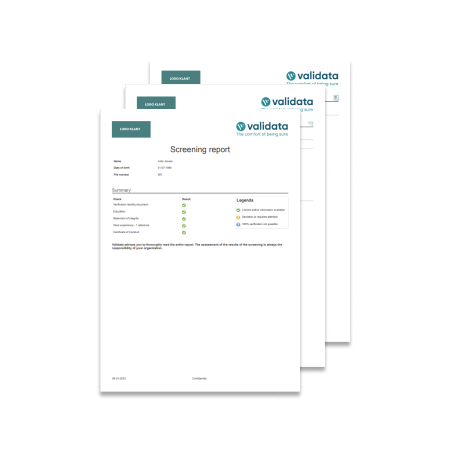What is a background screening check?
A background check in the Netherlands simply verifies a candidate’s background information, including claims about the presence of a criminal record, valid qualifications and work experience. After completing a background check, the employer can verify integrity.
Benefits of conducting a background check
We highlighted the greatest benefits of conducting a background check below:
- Risk management: By conducting a background check, you can safeguard integrity and protect your organisation from potential risks.
- Preventing a mishire: By checking whether the candidate really has certain diplomas and work experience, an employer can verify whether this candidate has specific skills.
- Quality management: The quality of your recruitment process is guaranteed when the applicant is screened upon hiring.
- Comply with laws and regulations: Different rules apply to each sector when it comes to hiring staff.
Points to consider when performing a background check
A background check consists of several components. For instance, in the healthcare sector, it is relevant to ask for a BIG registration, and for financial advisers, you should ask for a Wft diploma. Each situation and position require a different background check. The most common components are:
Education background check:
We verify the highest diploma obtained by checking it directly in DUO’s database
Identity check:
This verifies a passport, ID card or residence document
VOG background check:
A certificate of conduct allows an applicant to prove that their (judicial) past is not an objection to fulfilling a position
Criminal background check:
This document can be requested when an organisation works with international (potential) employees or Dutch employees who have temporarily worked abroad for a period of time.
International background check
Validata also offers support for international screening. Validata works for multiple multinational companies and screens candidates and employees located all over the world.
Thanks to our extensive network, your organisation is assured of transparent screening with a quick turnaround time of an average of 5 working days. Through our international background checks, your organisation can ensure integrity of international employees.
Today, Validata provides screening solutions to more than 1000 clients across Europe, screening candidates from more than 60 countries.
The process of a background check investigation
Step 1: Log in
Fill in your personal username and password.
Step 2: Choose a screening profile
Select the correct screening profile for the candidate.
Step 3: Fill in the candidate's details
The candidate’s name, email address, and cell phone number are requested.
Step 4: Candidate provides information
The candidate receives an email with their login details and goes through their screening.
Step 5: Screening is processed
Validata verifies the candidate’s input with its data partners.
Step 6: Screening is completed
Once the screening is completed, both candidate and client will receive a message that the screening report can be downloaded.

Background check according to the GDPR regulations
The General Data Protection Regulation (GDPR) was implemented on May 25th 2018. The requirements for companies and governments to be more accountable for what they do with personal data is a positive development, but it involves complex work and expertise.
Validata operates under applicable laws and regulations relate to screening processes, such as the GDPR and other relevant (local) laws.
Personal data security and all background check processes are top priority at Validata. Valluga is technologically designed and continuously developed using privacy and security by design. Additionally, Validata is ISO 27001 and 9001 certified and has an ISAE 3000 Type II assurance report.
Conduct a background check with Validata
It is crucial for organisations to make wellinformed and secure recruitment decisions to ensure continuous quality. By conducting a background check with Validata, you can be sure whether a candidate is suitable for a particular position. Moreover, you unburden your HR department by outsourcing the process to a professional screening organisation. This saves them a lot of time that they can better spend on your organisation’s core business.
- Permission: It is a legal requirement to have permission from the candidate before the background check begins.
- Verify sources: Verify the authenticity of sources to ensure accuracy. For example, call the referees and ask questions.
- Privacy laws: Make sure you comply with the privacy laws that apply to your organisation, such as the GDPR.
- Data security: Ensure the security of the collected data to guarantee privacy and trust.
- Legal: It is important to find out what laws and rules apply to your sector. This can be different for different countries.
In the Netherlands, employers must be aware of the GDPR. It is important that the purpose of the background check is communicated transparently to the employee. The candidate should always be informed that the screening will take place and what its purpose is.
When the background check starts, only relevant data should be collected. The regular retention period of screenings is 90 days.
It is also possible with our archive function to keep your data longer at Validata. Then all data is moved to our archive after 90 days. The data can then only be viewed by the employer. For Validata and the candidate, the data is anonymised. How long the data should be stored is up to the employer.
In some situations, a background check is mandatory. This depends on the position, situation, laws and regulations, and the country in which the employee works. For example, a VOG (certificate of conduct) is mandatory in the healthcare sector.
In many cases, it is not mandatory to do a background check as an employer. However, there are a few cases where it is legally required in the Netherlands. These are usually high-risk positions, such as positions in the financial sector, for example, where confidential information is handled.
The obligation of the law is often not the reason employers want to do a background check about their employees. Employment screening is about creating strong teams based on integrity and transparency. As a result, you can create a safe environment where both people and the organisation will continue to develop in a sustainable way.
Contact us
"*" indicates required fields
Contact us
"*" indicates required fields
Contact us
"*" indicates required fields
Contact us
Contact us
Download the white paper
Download the white paper
Download the white paper
Download the white paper
"*" indicates required fields
"*" indicates required fields
"*" indicates required fields
"*" indicates required fields







